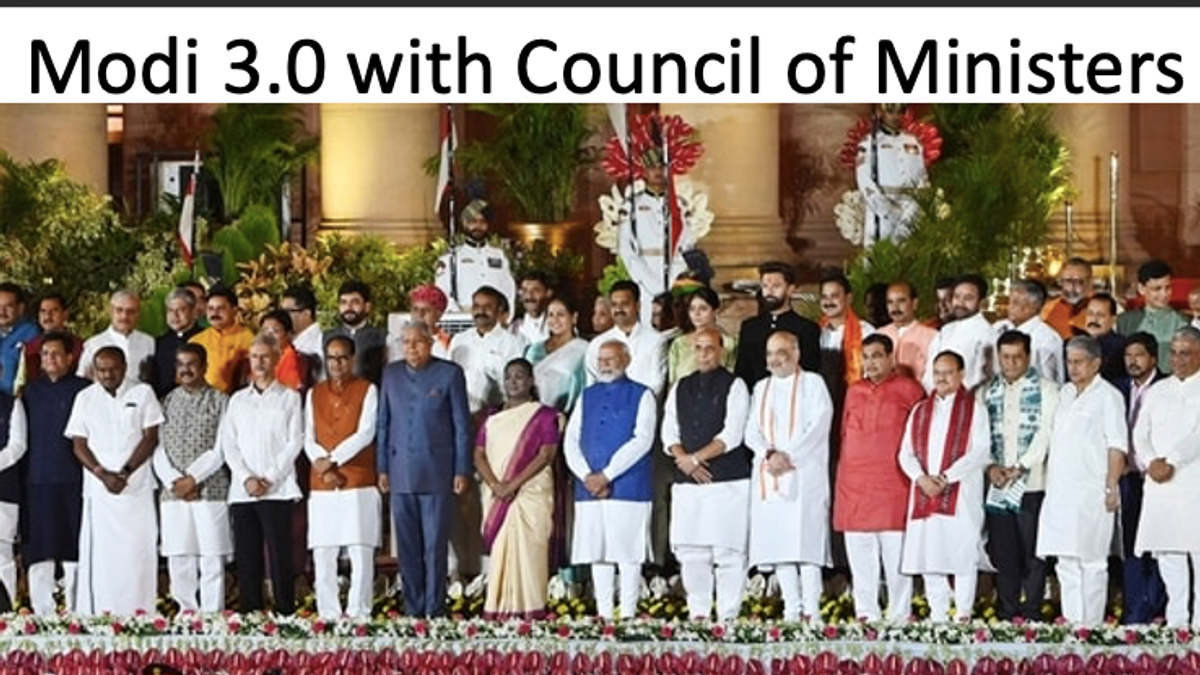
‘New India’ Needs Innovative Ministerial Reforms
In its eighth decade of being independent and seeking a new identity of forward looking ‘New India’, Modi govt has taken many initiatives, some innovative but many assumed an optics. This govt is still praiseworthy for taking those steps when all previous govts had taken their minds off major reforms. Minor tinkering of the ministries and policies have been going on since 1966 when the first ministerial reform was undertaken. Thereafter, some new ministries have been added from time to time as per needs but any logical radical reforms for increasing efficiency and to meet the future needs have eluded and most previous govts have merely introduced only cosmetic changes.
Drawbacks of Modi's Minimum Government Maximum Governance
PM Modi had set a narrative of “Minimum government, maximum governance” and tried to walk the talk too. It was a good slogan that should have done wonders if there was no substantial increase in new programs. However, soon after assuming charge, he started many new initiatives with numerous programs & projects that steeply increased the work-loads on several ministries. These steep rise in workload for a short-time could have been absorbed by the executives BUT new initiatives and programs kept adding up with no increase in the number of ministers or decision taking executives. As a result, after some time several programs started getting bogged down. For example, Modi 1.0 had initiated wonderful correlated program of employments for youths through skilling them, making available bank-loans to start their dream projects, get self-employed and provide jobs to the others too, and take the nation forward on the path of progress. However, its result after 9 yrs are far from satisfactory. In fact, political opponents of Modi govt started a strong narrative of failure (even if false), increase in unemployment. Similarly, ambitious projects like Smart Cities, regional linguistic promotion, Interlinking of rivers, Introducing technologies in agriculture (like drip irrigation, soil cards etc), making MUDRA scheme lucrative etc etc had their own bottlenecks with no one to redress. In short, Modi made an error in not increasing ministries and ministers in accordance with increased workload and providing innovative minds and hands to take forward those newer initiatives. This surely impeded the type of progress that PM Modi would have liked. Further, there were some other short-sighted approaches too in the governance as emphasized below.
Planning and adopting new initiatives need minds that can think beyond the given new mandates to ensure both a flawless implementation as well as provide value additions. It is unfortunate in India that often the meritorious people await on the sidelines and mediocrity find themselves in a chair that needs people having merits. Thanks to Ambedkar and his drafted Constitution as well as the group/class interests of the previous Govts over decades in framing flawed laws that brought reservation in high places in India. Among the ministers, there is no reservation yet It positions numerous below average/mediocre ministers in framing dream plans/projects. It ought to have been done by those having merits who as such, are available at high premium in the current government services. Govt of India has been riding a tiger of reservations which is becoming more and more problematic acquiring dangerous proportions. The initial Constitution, the Mandal commission, periodic constitutional amendments and now a highly divisive call for caste-based reservations by the likes of RJD and Congress are few to name. Surely, the governance in the reservation-based administration is going down the hill although not all executives employed under reserved groups are substandard. In general however, there is already a paucity of meritorious people in administration and it is going to worsen in the coming years.
Logical Rationalisation of Ministries
Nominating an MP to head a ministry, is the prerogative of the Prime Minister and there starts the problem of governance. The polity of India is becoming so complex that the shadows of reservations are increasingly affecting the governance. Even after Modi govt came with a narrative of reforming India, many of its ministries and departments have not been able to set and implement newer goals because their heads were lacking merits. The number of ministries have increased from 14 in 1947 to 51 by now. An illogical govt may like to have as many ministers to accommodate so as to meet political compulsions. However, Modi govt having a model of “minimum govt, max governance” was expected to regroup the ministries and department to minimise ministers, both cabinet and state ranks. For example, in Industrial growth oriented governance, there are several independent ministries such as , Commerce and Industry, Electronics & Information Technology, Communication, MSME, Heavy Industry, Steel, chemicals & Fertilisers and Textiles which is considered unnecessary. However, even Modi avoided such reforms and allowed numerous ministries.
There is hardly any justification in having so many of those independent ministries, some even having lost its meaning. For example independent ministries of social justice, Panchayati raj, Tribal affairs etc could be clubbed for a better and meaningful governance. Similarly, there are many others that could have been clubbed together such as Agriculture and Fisheries; Earth science, Env, forest & Climate change and Renewable Energy; Health and Ayush; Mines, Coal, Petroleum & natural gas; Transport, road, rail, shipping etc etc are only a few to name. Obviously, PM could have set-up a committee of able persons who could have logically clubbed some of the existing ministries in related grouping and also kept a scope of future needs. ‘New India’ has to be future-ready, it must have all such scopes of adopting newer programs at a short time with high efficiency and innovation. Similar manipulations are required in selecting an able minister. You can’t keep a donkey on a chair that needs a hat of innovative thinking.
Having already mentioned that nominating ministers is the prerogative of the PM, wisdom comes only when an algorithm is formed to capitalise on the available human resources. Musical chair in the Health ministry in the recent years has been uncalled for. In the last 75 yrs, ministry of Culture has seldom had a person of innovative thinking who could have promoted Indian Culture which is a way of life that trickles down from the Vedic traditions, keeping a fine balance with modernisation, nature, humanity and all forms of lives. These practices must be inculcated in the schools and colleges that promotes non-indulgence into all forms of violence, protecting Human Rights. On the contrary, the cultural promotion of the majority was prohibited during successive Congress govts.
Bringing Efficiency in Govt Depts
An able minister is expected to possess a combination of professional and managerial skills relevant to one’s department so to give a direction to the executives in achieving the goal. Modi 3.0 government is already in place. he may like to start reviewing the efficacies of his ministers whether they possess the requisite skills to manage those ministries and departments so as to get the best out of it and also make it future ready for ‘New India’. In an effort to strike a balance between efficiency and mediocrity, he must not compromise on quality. Govts may make a policy that may permit taking a prominent talent of opposition parties too as ministers or his advisors. All important ministries may have a group of ‘experts of par excellence’ as advisors to shape the respective ministries ready to step to future needs in both technologies and humanity. PMO must review the progress in all ministries periodically in ‘Key Response Areas (KRAs)’ and modify approaches if so felt.
At present, the pressing problems of the govt are in creation of jobs (govt or self-employment) for its youth. The next is the reforms in the agriculture. Kisan leaders as ministers of state preferably from Punjab/Haryana with a mandate to reach out pan-Indian farmers could have been conducive. Similarly, making the self-employment schemes lucrative thru’ added initiatives, is the need of the hour. Govt can conveniently reform self-employment beneficiaries. One such approach was forwarded to the govt but that didn’t find its favour (read “Employment to all Indians: a possibility”, https://thecounterviews.in/articles/employment-for-all-indians-a-possibility/). Modi govt has done a lot in this direction. It is only a matter of walking an additional mile that can resolve the problem of unemployment. Another major problem cropping up is the religious discord with fast changing religious demography of India in favour of Muslims that is bound to pose insecurity to the Hindu majority (read “भारत में बढ़ती मुस्लिम आवादी: एक खतरा”,https://thecounterviews.in/articles/increasing-indian-muslim-population-a-danger/). This must be redressed on priority. It is also the high time that Govt of India inducts a ‘Parliamentary Committee for Foreign Affairs’ that could serve Indian interests abroad essentially to leverage the own (read “Urgent Issues before Indian Parliament:, https://thecounterviews.in/articles/urgent-issues-being-ignored-parliament/). Hindu & Sikhs are undergoing a serial genocide in Afghanistan, Pakistan and Bangladesh, yet Indian parliament is mum.
The Bottom-Lines
Modi Govt 3.0 has been put in place after the electoral win of the NDA in 2024 election. This is the first union govt under PM Modi which lacks BJP MP’s numbers. It has to bank upon its allies some of whom have different perspectives on many issues and challenges facing nation. PM has already nominated members to most of its ministry some of whom may prove to be mediocre. Such ministers are bound to slow the progress in some of the KRAs. It is hoped that Modi will do the desired course corrections in the due course of time in order to pursue a path of all-round development of India and its citizens. Afterall, ‘New India’ must have all ingredients that could take it towards a ‘Developed India’.
